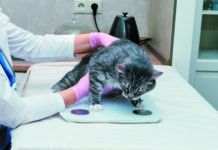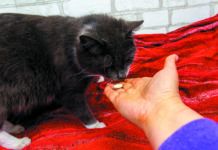[From Tufts February 2011 Issue]
I trapped two stray kittens last year and had them treated for ringworm. They were neutered and given two rounds of kitten vaccinations. They also had bad breath so my veterinarian cleaned their teeth and needed to extract some teeth. She informed me that one cat’s dental problems had migrated into the root.
In trying to pinpoint a cause (other than juvenile gingivitis), my veterinarian tested the young cats for herpesvirus and calicivirus. She sent the test results to the Texas Veterinary Medical Diagnostic Laboratory and the results came back positive for feline calicivirus at “1:256” for both cats. I’m not sure exactly what that means. I had a different test performed by another veterinarian — a PCR test — and it came back negative on both cats.
I am confused and concerned by the conflicting test results. I am afraid to expose them to my cats, especially one I have who suffers from chronic allergies and has only had minimal vaccinations. The cats are currently isolated from our other cats in my household. They show no signs of calicivirus or upper respiratory problems. Is there any way to say with certainty that they are negative? Do you see any reasons not to introduce them to other cats who could be at risk?
Donna Poulos
Dear Donna: Your discussion centers around two common viruses of cats — herpes and calicivirus — which cause, in most cases, mild and self-limiting upper respiratory infections, commonly referred to as “colds.”
You may have gone a bit further diagnostically than I would have recommended. Since common vaccines contain both herpesvirus and calicivirus, it is not unexpected for your cats to have antibodies against the viruses (as detected by the “SN,” or antibody test). The detection of antibodies does not confirm infection, but merely indicates that vaccination has been performed and that your cat’s immune systems have responded appropriately. The “PCR” test, which looks for particles of the actual virus, was negative. Without getting deeply into the pros and cons of PCR testing, this would suggest that active shedding of the virus is not occurring at the time testing was performed. This suggests that contagiousness to other cats would not be present.
Unfortunately, herpesvirus can reactivate and be shed intermittently at any time. So there is no way to say that a cat will never shed herpesvirus in the future. The story for calicivirus is similar, although some researchers feel that lifelong cure may occur in some cases.
The bottom line is that I don’t commonly test for either calicivirus or herpesvirus. I just assume that these viruses may be present and that the introduction of new cats into a household has the chance to trigger a round of upper respiratory infections. But colds are, in most cases, not a big deal. There’s plenty of other infectious disease that should be checked for (such as feline leukemia virus, feline immunodeficiency virus, parasites and ringworm) when new cats are introduced, however, my concern about herpesvirus and calicivirus is very low. I wouldn’t worry about the possible spread of cold viruses, and as long as they are otherwise healthy, introduce your new cats to the house.
Michael Stone, DVM
Clinical Assistant Professor
Cummings School of
Veterinary Medicine at
Tufts University



